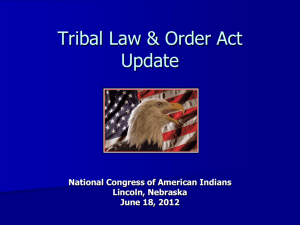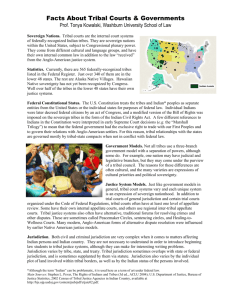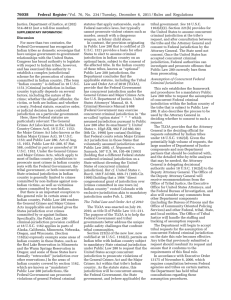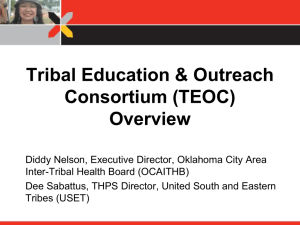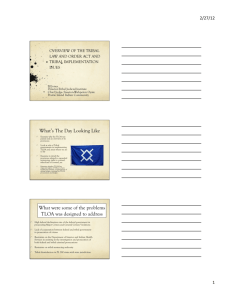pl 280 & federal concurrent jurisdiction
advertisement
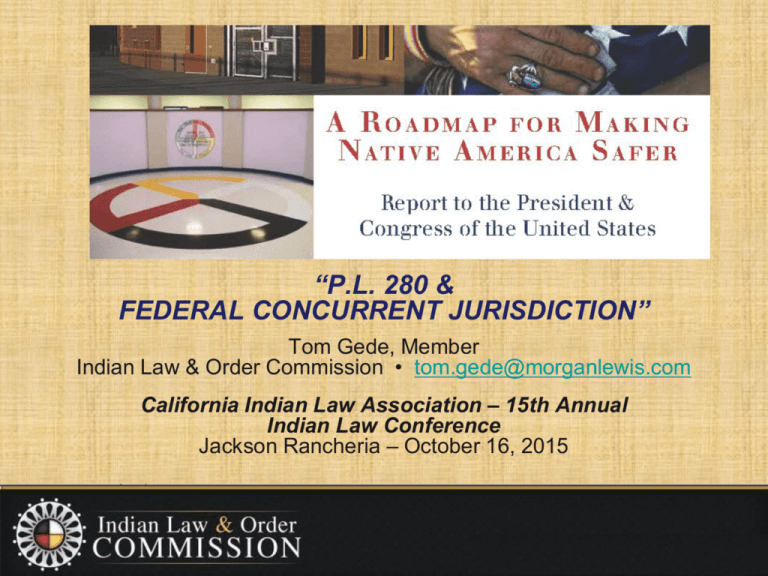
“P.L. 280 & FEDERAL CONCURRENT JURISDICTION” Tom Gede, Member Indian Law & Order Commission • tom.gede@morganlewis.com California Indian Law Association – 15th Annual Indian Law Conference Jackson Rancheria – October 16, 2015 ABOUT THE COMMISSION • Created by Tribal Law and Order Act of 2010 (TLOA) to advise the President and Congress on Federal, State and Tribal reforms to strengthen criminal justice for the 566 Federally recognized Indian Tribes and Nations. • Planned and executed comprehensive assessment of Native American and Alaska Native public safety and criminal justice. 2 3 Tribal Law and Order Act of 2010 Indian Law and Order Commission (ILOC) created: to conduct comprehensive study of law enforcement and criminal justice in tribal communities, such as: jurisdiction over crimes committed in Indian country tribal jail and federal prisons systems juvenile justice systems -- tribal and federal the impact of the Indian Civil Rights Act of 1968 4 ILOC held field hearings, took testimony, appointed and consulted with an Tribal Advisory Board in all 12 BIA regions, and worked entirely in the field – from Alaska to the East Coast. Unanimously prepared and approved THE ROADMAP FOR MAKING NATIVE AMERICA SAFER – a 324-page report, with 40 major recommendations. 5 Concurent Jurisdiction under Tribal Law and Order Act of 2010 • TLOA allows Indian tribe in a mandatory PL 280 state (like California) to request the U.S. to accept concurrent jurisdiction 6 • Normally . . . U.S. can only resume criminal jurisdiction in Indian country when a State retrocedes PL 280 jurisdiction back to the U.S., and the Justice Dept accepts it - - not concurrent state and federal 7 The Statute: Section 221(b) • Indian tribe subject to mandatory PL 280 jurisdiction may request the U.S. to accept concurrent jurisdiction • If 221(b) request is accepted, U.S. Attorney can prosecute violations of General Crimes Act / Major Crimes Act, while at same time State authorities can enforce state Penal Code 8 TLOA Section 221(b) = 18 U.S.C. 1162(d) • Final regs to implement 1162(d) issued by OAG/DOJ, eff. Jan. 5, 2012 • U.S. Attorney General is deciding official. Delegated to Dep. AG • Recommendations from FBI, COPS, other fed, state, locals. OJT to staff it 9 Sec. 221 Regs – general info • Only pertains to “mandatory” PL 280 states • Does not require approval of a state • Distinct from “retrocession” • State does not lose criminal jurisdiction • DOJ view: it already has federal juris. in “optional” PL 280 states 10 Procedures for Request • Request from chief executive officer of federally recognized tribe • To Office of Tribal Justice / DOJ • Explain why assumption of concurrent federal jurisdiction will: (i) improve public safety and criminal law enforcement, and (ii) reduce crime in Indian country of tribe 11 Process • OTJ publishes notice within 30 days of receipt • sends written notice to state / local agencies, requests comments 45 days • comments from U.S. Attorney offices, FBI, other DOJ 12 Eight Factors to be Considered by DOJ (I) (i) improve public safety and reduce crime? (ii) increase availability of law enforcement resources? (iii) improve access to judicial resources? (iv) improve access to detention and correctional resources? 13 Eight Factors to be Considered by DOJ (II) (v) comments from FBI, USAO’s, other DOJ (vi) comments from DOI, BIA, DHS, other fed agencies (vii) comments from tribal consultations (viii) comments others: governors, state and local law enforcement agencies 14 The unspoken “Ninth Factor” to be Considered by DOJ $$$ from DOJ budget: general obligation? within budget authority? FY2016 $21M for USA’s in Indian country FY2016 $34M for FBI in Indian country 15 OTJ Testifies to Indian Law & Order Commission • Office of Tribal Justice Director Tracy Toulou testified before ILOC – March 8, 2012 • Noted requests received by Feb 28 of each calendar year will be prioritized for decision by July 31 of same calendar year; by Aug 31 for decision Jan 31 of following year 16 Pending and Approved Requests for Federal Concurrent Jurisdiction (I) (i) White Earth Nation (MN) – approved March 14, 2013 (ii) Mille Lacs Band of Ojibwe (MN) – noticed March 19, 2013 (iii) Hoopa Valley Tribe (CA) – noticed October 22, 2012 (iv) Table Mountain Rancheria (CA) – noticed October 22, 2012 17 Pending and Approved Requests for Federal Concurrent Jurisdiction (II) (v) Elk Valley Rancheria (CA) – noticed June 4, 2012 (vi) Los Coyotes Band of Cahuilla and Cupeno Indians (CA) – noticed April 12, 2012 -- N.B. – LCB has withdrawn its application 18 White Earth Experience (I) • From report of Randy Goodwin, Director of White Earth Dept. of Public Safety • WEN thought TLOA approach easier than retrocession • Background: tribe has “concurrent jurisdiction” with local county sheriff under MN law if meets conditions and enters into “cooperative agreement” w/ local law enforcement. 19 White Earth Experience (II) • 3 separate Law Enforcement Cooperative Agreements w/ 3 county sheriffs, all different one from the other • WEN thought sheriffs had lack of confidence in WEPD • Calls & response from SO’s needed improvement • Many cases not being charged or were dropped for different reasons 20 White Earth Experience (III) • Appeared to lack support from District Court • WEPD continued to build PD • At ground or “cops” level, some improvements • Eventually, locals were convinced WEPD was professional • MN US Attorney invited WEPD to quarterly meetings 21 White Earth Experience (IV) • WEN proceeded with submitting application under 221 of TLOA • Met with OTJ Director Tracy Toulou • Application included required elements & revised tribal constitution and bylaws • Also included crime statistics on White Earth Nation; included plans for correctional facility 22 White Earth Experience (V) • After approval, team of counties and WEN formed to implement TLOA • Feds, locals, all invited to participate, monthly meetings • Developed flow chart for prosecution of offenses committed on the reservation 23 24 White Earth Experience (VII) Key next steps: • Building relationships (unifying cooperative agreements, radio infrastructure, better prosecution of cases presented, search warrant procedural improvements) • Prosecution Guidelines (MN US Attorney criminal prosecution guidelines promulgated) 25 Caveat: Justice Department Views (I) • In what is called a “congratulatory letter” accepting concurrent jurisdiction, Dep AG outlines important limitations • Disclaimer: In all cases involving federal criminal jurisdiction, the Department of Justice will decide whether or not to investigate and bring charges • Assumption of jurisdiction does not mean that DOJ will prosecute all crimes or even all major criminal cases occurring on the reservation. 26 Caveat: Justice Department Views (II) • “Rather, consistent with its exercise of prosecutorial discretion in all criminal matters, the Department will determine which cases can most effectively be prosecuted at the Federal level and will pursue those cases.” • “In this regard, we do not anticipate that we will bring a large number of cases; rather, we will focus on bringing cases that will have the greatest impact in increasing public safety on the White Earth Reservation.” 27 Conclusion • TLOA Section 221 presents as many challenges as opportunities. It only adds federal jurisdictional authority as a layer on existing state and tribal authority. • However, the concurrent federal jurisdiction can ease the burden of overstretched or reluctant state/local criminal law enforcement and judicial resources, and overstretched or developing tribal law enforcement and judicial resources. 28

